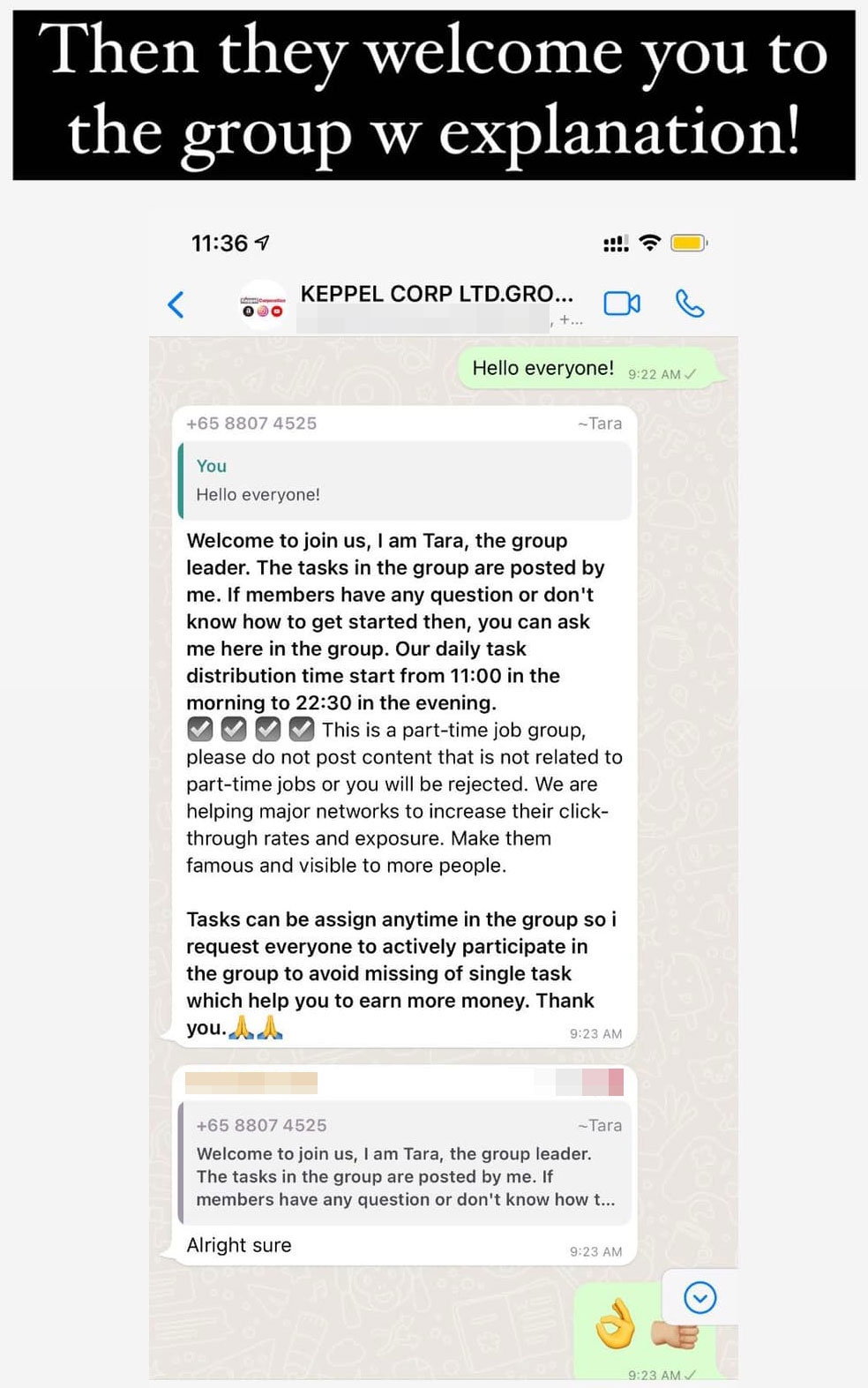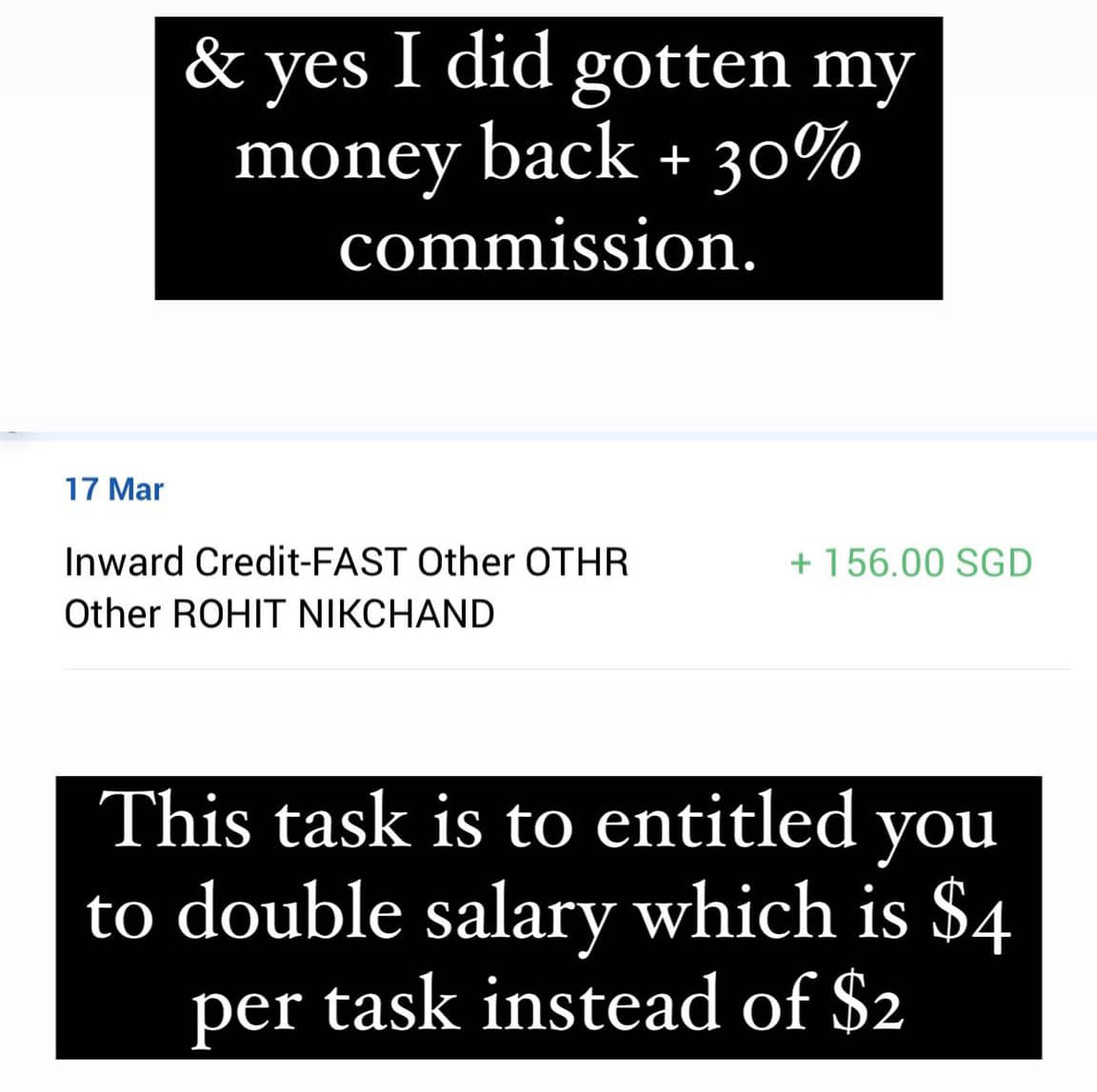Follow us on Telegram for the latest updates: https://t.me/mothershipsg
A woman in Singapore signed up to join an e-commerce affiliate business group knowing very well it is likely a scam.
Her goal?
To reveal the modus operandi of the Ponzi-like e-commerce affiliate business scam groups targeting job-seekers in Singapore with promises of easy work and fast cash, for minimal effort.
Here's what she found out.1. Recruitment via social platforms
The woman in Singapore was intrigued by the ads she was served: One ad promised part-time work with ridiculous remuneration for minimal effort.
2. To start of, she presented herself as an interested applicant
The woman contacted the e-commerce affiliate business group.
The person who responded then misrepresented themselves by using recognisable brand names such as Keppel Corp, Amazon, Instagram and YouTube.
There is no real explanation regarding how the business works.
3. The new prospective recruit then led to join a group chat
The group chat was likely made up of other interested applicants, as well as members of the syndicate running the e-commerce affiliate business group.
A good mix of such individuals would add a veneer of authenticity to the operations as would-be victims feel there are other real people chatting together.
4. The newest member gets informed via bulk instructions on the tasks ahead
Such a message will prime the applicants that the jobs are up for grabs and they need to be on standby to complete them.
5. First no-brainer task
The first task started out very easily: Simply clicking on social media content and getting paid S$2.
6. Next task is where the jobs promise more commission
To lure applicants in and turn them into victims, the syndicate dangles more monetary rewards -- by getting the would-be victim to first part with a small sum of money with the promise of getting more in return quickly.
The next task requires "purchasing" an item.
The need to follow multiple steps set out by the syndicate presents a veneer of effort required on the part of the would-be victims -- which they could use as justification to themselves that they got work done and deserve money for it.
7. Give S$120 and get S$156 back: S$36/ 30% profit
To hook the would-be victims, the syndicate would first have to show they are serious about paying out real money: In this case, giving 30 per cent profit back on a S$120 principal sum.
This allows the would-be victim to get a taste of making S$36 in a short period of time.
8. S$36 profit honoured with payout
The payout is real.
After money gets transferred to the would-be victim, they get a taste of what it's like to make some money quickly.
9. S$88 bonus up for grabs next
The syndicate would then try to recoup their losses by upping the promised payout reward to S$88 -- with the completion of more tasks in quick succession.
10. Would-be victim has to fork out S$520 first
If the would-be victim takes up this offer, the syndicate would have won.
By asking the would-be victim to pay S$520 upfront, the syndicate would have recouped previous sums of money given out.
The syndicate is trying to lure the would-be victim in with parting with more money in quick succession with the promise of higher returns.
11. Cannot go back to previous "Like" task
If the applicant wants to back out to doing simpler tasks without completing any of the "purchasing" tasks, the syndicate will say there is no way back to the easier "Like" tasks to get smaller sums of money.
The syndicate would even ask the applicant if he or she is being a bully now.
12. Bombard members in the group with reminders to complete tasks
The syndicate would then bombard the group chat with constant reminders to carry out tasks to make money on the side and help big businesses.
It does appear that if the applicant stops doing anything after getting the first one-time profit payout of tens of dollars (see point 8 above), there is nothing the syndicate can do about it.
Singapore police just made arrests locally
The Singapore Police Force on March 20 announced they have arrested eight men for their suspected involvement in two separate series of Ponzi-like job scams.
This was after the police received reports between December 2021 and March 2022 about victims receiving unsolicited WhatsApp messages and Facebook or Telegram posts with advertisements promoting highly paid part-time affiliate marketing related jobs.
The victims were required to complete easy tasks, such as making online purchases as part of the fake online jobs offered by the scammers.
The victims were then directed to recruit more members to upgrade their membership status.
If they did this, they can perform more job tasks and earn their commission.
When further commissions did not materialise or when victims were unable to make withdrawals from their member accounts, they realised they have been scammed.
The Ponzi-like schemes worked by using new job seekers’ money to pay the promised commissions to existing job holders, early investigations showed.
Follow and listen to our podcast hereIf you like what you read, follow us on Facebook, Instagram, Twitter and Telegram to get the latest updates.












